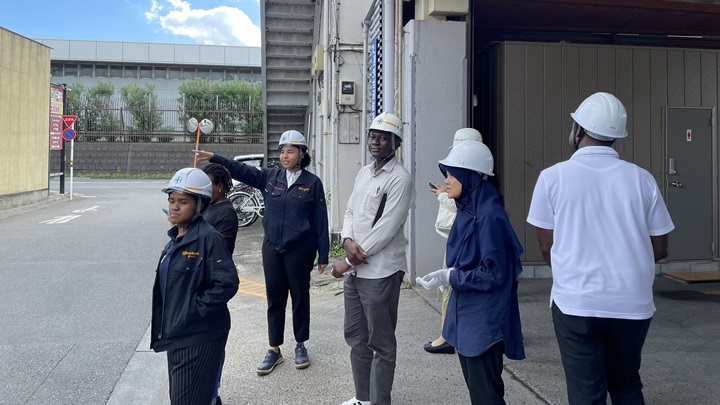Blog Post | Translating Japanese Know-How and Innovation for the African Workplace: What Is It That Makes ABE Scholars Unique?
2025.08.18
Researchers at the JICA Ogata Sadako Research Institute for Peace and Development (JICA Ogata Research Institute) have wide-ranging experience and diverse backgrounds, and they are forging partnerships with various stakeholders and partners. This series of blog posts shares the knowledge and perspectives that they have acquired through their research activities. Kaizuka James
, Research Fellow, who works on the research project “Making Japan’s Business Africa’s Business: Exploring the Impacts of the ABE Initiative,
” wrote this post.
Author: Kaizuka James, Research Fellow, JICA Ogata Research Institute

As we approach the 9th Tokyo International Conference on African Development (TICAD-9), it is important to reflect on one of the most prominent and high-profile contributions that the TICAD process has borne: the ABE Initiative. Officially titled the “Master's Degree and Internship Program of African Business Education Initiative for Youth ”, the program has so far taken around 1,900 participants and has seen representation from all 54 African countries, who have studied a wide variety of subjects. So what sets ABE apart from other scholarships, both those offered by JICA and those offered elsewhere? How can this uniqueness be harnessed so that the potential of ABE ex-participants is maximized? In this post, I will explore one of the most effective use cases of ABE graduates as “cultural translators,” bringing Japanese work practices and techniques to their local context, and making the most of the unique capabilities that only ABE ex-participants can offer. In short, let us answer the question: Why is it worth paying attention to the ABE Initiative and to ABE scholars?
This winter, I had the privilege of visiting four African countries – Egypt, Kenya, South Africa, and Rwanda – and meeting 74 of the 1,900 or so ABE scholars from across the entire continent. As part of this work, I heard a considerable number of deeply inspirational stories from ABE ex-participants and their employers, who spoke passionately about their time in Japan and their contributions since returning home.
One story I would like to recall concerns an on-site interview at a major automotive firm. As was the usual case, I had prepared a detailed list of interview questions about the ABE Initiative and how ABE ex-participants were being employed by the company, expecting the typical procedure of a 45 minute to one hour interview to take place. The experience was considerably more illuminating than such a standard interview procedure.
As we were greeted by the CEO, a Japanese business executive dispatched by the company’s headquarters in Japan, he spoke enthusiastically about his two ABE staff. Rather than a traditional interview, most of the questions were answered via a 45-minute-long presentation meticulously prepared on the topic of the fundamental excellence of the two ABE employees under his care. In particular, he mentioned a desire for them to be “cultural translators” – people who understood both the concepts they had learned in Japan, but also understood them in a manner that could be localized and introduced for local staff working in the in-country assembly plant.
There is one quote that stands out in my interview notes with particular power and prominence, which left me with a feeling that this is a company which really understands the ABE Initiative:
“I want them to develop this country’s own style of monozukuri.”
In his calculation, by introducing the “spirit of manufacturing” philosophy among the local workforce, his company’s competitiveness would increase, and the company’s future in the country would be made more secure. He felt that by introducing a local “spirit of manufacturing” that the quality of his company’s end-products and their suitability for the local market would improve. The ABE scholars were set to lead this charge. The ABE scholars themselves agreed, with one noting that in a car firm, a production boost of even one vehicle per day on the assembly line would represent a significant productivity improvement. They had already been strongly involved in kaizen activities and spoke highly of the value of introducing these practices, which they had learned during their time working in one of the company’s Japanese factories as interns on the ABE Initiative, and which they mentioned had been a transformative experience for them.
This is in precise accordance with the ABE Initiative’s objectives and what it aims to achieve in terms of bridge-building and business development. Only ABE scholars, leveraging their unique positions as people who possess a powerful understanding of both countries through their high levels of technical expertise, and through their business-mindedness and drive to succeed, can achieve these objectives. The role they can play in cultural translation and the promulgation and adaptation of the best of Japanese practices, combining them with the best of local practices and an entrepreneurial spirit, represents the best of what ABE can offer.
Let’s look a little more at what makes this case stand out.
The ABE Initiative is often understood as being made unique by its stringent focus on business and entrepreneurship, and on the promulgation of Japanese business practices and culture. Indeed, this is certainly a critically important aspect of ABE, and this case demonstrates the importance of these aspects. As alluded to in the previous section, by the time they are finished with the program, ABE scholars are expected to have familiarity and affinity with Japanese business culture through both classroom and practical experience via internships. This is true not only of the ABE scholars in this particular automotive firm, but of all ABE scholars across the entire continent.
However, while certainly of high importance to the program, this focus on business and Japanese management techniques alone does not make ABE unique. ABE should not be misunderstood as a program of transforming talented African students into Japanese salarymen – if that were the case, the automotive firm could simply have flown out domestic Japanese employees to Africa from Haneda Airport and achieved the same results. Far from this, ABE scholars are unique because they carry expertise about both Japan and their home country, and can use this dual position to facilitate business environment improvements and act in this position as “cultural translators”, as exemplified in the case above. As was aptly put by my interviewee, “they (ABE scholars) know the Japanese way, but they still have an African mind”.
ABE scholars are indeed brought to Japan to study specific fields, acquire specific technical knowledge, and acclimatize to Japanese business culture, but this does not mean that they forget their roots, and in interviews with them, most expressed strong feelings of patriotism and a desire to contribute to their own countries’ development. Most ABE scholars I spoke to expressed a passion for business and entrepreneurship as a means to achieve this, and said that this is what made the ABE Initiative stand out to them.
For the ABE scholars in automotive firm, they were passionately committed individuals who saw ABE as a unique opportunity to not only further their own careers, but also to contribute to their country’s development through economic growth. For them, bringing the best of Japanese knowledge and experience to Africa was a patriotic act on the mission to create a better future for themselves and those around them. This was a widely held view by ABE scholars across all four countries I visited, regardless of sector or expertise.
These core ingredients – knowledge of Japan and its business culture, knowledge of and patriotism for home, knowledge of specific technical expertise, and a strong entrepreneurial spirit - can form a potent cocktail if utilized effectively. These components are what make ABE stand out in a crowded field of international scholarships. ABE scholars are uniquely placed to bring the best of Japanese knowledge to Africa, translating it for the local context.
When launching the ABE Initiative during his opening speech at TICAD-5 in 2013, then-Prime Minister Abe Shinzo set out the vision for a future wherein “Africa's promising young people will soon play the leading roles in businesses that connect Japan and Africa”. This blog has shown one way that ABE scholars are doing just that. They are the best of Africa, bringing the best of Japanese knowledge home with them, and translating it at home with an unrivaled passion and drive.
For stakeholder organizations, the implications of this are simple; ABE scholars’ unique knowledge and skillset can and does allow them to create meaningful contributions, as in the case mentioned above, for mutual benefit. By embracing their skills as cultural translators, rather than solely relying on their technical expertise, greater benefits can be gained. While the technical knowledge is obviously a key benefit, it is on the side of improving processes, practices, and efficiency that ABE scholars can really shine as “cultural translators”, whether through introduction into an African organization, or through adaptation for other local staff within a Japanese organization. In the case of the automotive firm mentioned in this article, the CEO had a powerful vision of his ABE scholars improving the company’s manufacturing output and competitiveness in the local market through their powerful understanding of both Japanese practices and local conditions.
In short, the true value of the ABE scholar is to combine Japanese innovation with African determination, and those who understand this formula are the ones likely to see the greatest benefit from their ABE staff. ABE scholars for stakeholder organizations should represent the best of both worlds – the best of Japanese knowledge, and the best of African drive and ambition.
Disclaimer: All opinions expressed in this blog post are the author’s and do not reflect opinions of JICA or the JICA Ogata Research Institute.
James Kaizuka
A graduate of the University of Leeds in the United Kingdom, he assumed his current position in 2024. His main research concerns the ABE Initiative scholarship program and its impacts on human resource development, socioeconomic development, and the construction of Japan-Africa links.


事業事前評価表(地球規模課題対応国際科学技術協力(SATREPS)).国際協力機構 地球環境部 . 防災第一チーム. 1.案件名.国 名: フィリピン共和国.

事業事前評価表(地球規模課題対応国際科学技術協力(SATREPS)).国際協力機構 地球環境部 . 防災第一チーム. 1.案件名.国 名: フィリピン共和国.

事業事前評価表(地球規模課題対応国際科学技術協力(SATREPS)).国際協力機構 地球環境部 . 防災第一チーム. 1.案件名.国 名: フィリピン共和国.

事業事前評価表(地球規模課題対応国際科学技術協力(SATREPS)).国際協力機構 地球環境部 . 防災第一チーム. 1.案件名.国 名: フィリピン共和国.

事業事前評価表(地球規模課題対応国際科学技術協力(SATREPS)).国際協力機構 地球環境部 . 防災第一チーム. 1.案件名.国 名: フィリピン共和国.